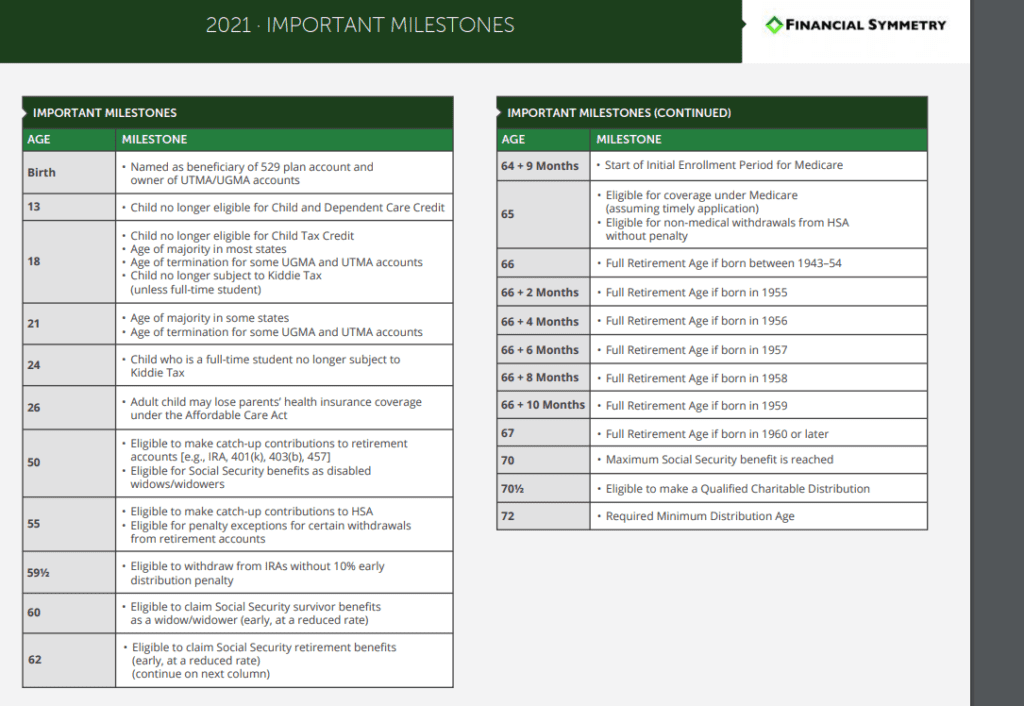We all have those milestones in life that we enjoy reflecting on or looking forward to. Graduations, weddings, and births of children are a few that stick out.
However, there are financial milestones that are also important to remember. While maybe not as memorable, they can be just as valuable.
The most important times (financially) in a child’s life
- Birth – As soon as your child is born you can start contributing to their financial future. Once that child has a Social Security number you can open a 529 account in their name. This is a popular way to save for that little bundle of joy’s education. Another account that you can open for your child at birth is a Uniform Trust for Minors account (UTMA).
- Age 13 – This is the age when your child is no longer eligible for the dependent care tax credit. The dependent care credit covers day care, after-school care and summer camp.
- Age 18 – Your baby is no longer a child at this point, so that means you must say goodbye to the child tax credit. Also at age 18 (or 21 in some states), a child’s UTMA will be transferred to their name. This is also an opportune time for you and your child to think about creating a healthcare power of attorney.
- Age 26 – Yes, technically they are not children at this age, but this is the age when children lose eligibility for their parents’ health insurance.
The years before retirement have plenty of financial milestones
There is a lot to remember to stay on track in the years leading up to retirement. By this time in life, you are probably beginning to dream about that upcoming milestone. To make sure that you stay on track for retirement, pay attention to these ages.
- Age 50 – You can now contribute $6,500 more per year to your 401K and $1000 more per year to your IRA accounts.
- Age 55 – You can now make HSA catch-up contributions of an extra $1000 per year. You should also note that some 401k plans allow for penalty-free withdrawal at age 55.
- Age 59.5 – This is when you can finally access your retirement accounts without a 10% penalty. You’ll also have the ability to roll over a portion of 401K to your IRA even if you are still working.
- Age 60 – You are now eligible for Social Security survivor benefits.
- Age 62 – You now can qualify for Social Security benefits. But should you? Listen in to hear why this may not be the best idea.
What’s in store for you once you reach retirement age?
Congratulations, you’ve made it to retirement age! Let’s find out what milestones are in store for you next.
- Age 65 – You probably won’t miss this one due to the amount of mail that you’ll be getting. You’ll want to review the literature so that you know what kind of Medicare to sign up for. You can also now withdraw HSA funds for non-medical purposes without a penalty.
- Age 66-67 – Full retirement age for Social Security used to be age 65 but now, depending on your birth year, it is between 66 and 67.
- Age 70.5 – This used to be the time of life when you had to take RMDs. Now the only notable aspect of this age is that you can make qualified charitable distributions (QCD). This is a fantastic way to donate money to your favorite charities if you are so inclined.
- Age 72 – The required minimum distribution age has recently increased from 70.5 to 72.
Who is holding you accountable?
You may know about many of these milestones, but it is helpful to have a reminder to take action once you reach these ages. One way to ensure that you are making the most of your financial life is to have someone help hold you accountable. A fee-only financial advisor with Financial Symmetry can do exactly that. Give us a call if you would like to ensure that you are doing everything you can to stay on top of your financial life.

Outline of This Episode
- [2:19] What to think about when children are born
- [5:52] Why age 26 is important
- [12:55] You can take Social Security at 62, but should you?
- [16:35] The RMD age has changed
- [18:13] Today’s progress principle
Resources & People Mentioned
- Table Topics Game
- Episode 59 – Tax Solutions for Charitable Giving
- Episode 46 – What Tax Strategies Am I Missing?
- Episode 72 – 7 Tax Reform Strategies and How to Spot Them
Connect With Chad and Mike
- https://www.financialsymmetry.com/podcast-archive/
- Connect on Twitter @csmithraleigh @TeamFSINC
- Follow Financial Symmetry on Facebook






